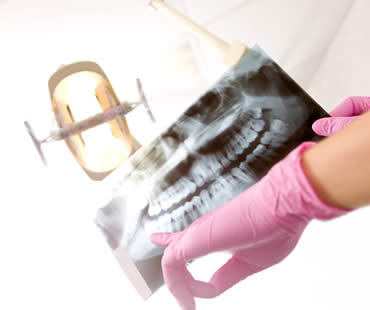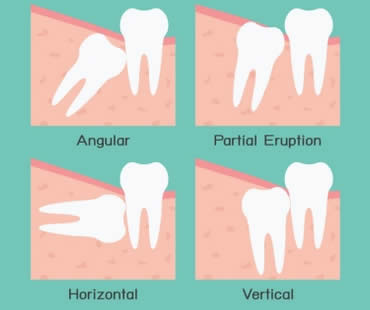
Also called third molars, wisdom teeth are the last set of teeth to erupt, typically appearing in the late teens or early 20s. While some people experience no issues with their wisdom teeth, many require removal due to potential complications. Below are some common questions and answers about wisdom teeth:
Do I need to have my wisdom teeth removed?
Not everyone needs their wisdom teeth removed. If they aren’t causing problems, they can remain in place. However, many wisdom teeth become crooked or impacted, leading to issues with surrounding teeth. Additionally, they are often difficult to clean properly, increasing the risk of tooth decay and gum disease.
When should I have these teeth taken out?
Most dentists recommend removing wisdom teeth between the ages of 16 and 22. At this stage, the roots are not fully developed, reducing the risk of complications during and after surgery.
Are there any risks?
As with any surgery, wisdom tooth extraction carries some risks. The primary concerns include:
- Nerve Damage: This is more common in older patients because the roots are fully developed and closer to the nerves.
- Dry Sockets: Occurring when blood clots dislodge after surgery, dry sockets can lead to pain and delayed healing.
Does my age matter?
Although symptoms may not appear until the 30s, 40s, or even 50s, surgery is generally easier and recovery is faster when performed at a younger age. Older patients often face more complex extractions and longer healing times.
If you’re experiencing discomfort or suspect an issue with your wisdom teeth, contact Longview dental office at Scott Distefano, DDS for a comprehensive evaluation and treatment options.
Wisdom teeth are the last adult teeth to erupt into the mouth, generally emerging between the ages of seventeen and twenty-one. They are the third set of molars and are in pairs: two each on the top and bottom arch of teeth. While some patients don’t have wisdom teeth, most do. Many of those who do have them don’t have enough room for those teeth to erupt fully, causing them to be wedged under the back of another tooth, impacted in the gum.
Impacted wisdom teeth are very difficult to clean, and can negatively affect the surrounding teeth. They are highly vulnerable to disease and decay and may lead to tooth pain and damage to adjacent teeth. For these and other reasons, a dentist may recommend that the teeth be extracted through oral surgery as soon as necessary to prevent any problems.
Extraction of wisdom teeth is typically an outpatient procedure done in an oral surgeon’s office. A healthy patient can proceed with a typical surgery, but if any infection is detected, the surgery can’t move forward until the infection is cleared up through the use of a full course of antibiotics. Once the surgery is moving forward, the surgeon’s team will administer some form of anesthesia to numb the area surrounding the tooth or to possibly sedate the patient through IV sedation dentistry.
After the anesthesia has fully taken effect, the surgeon makes an incision to open the gum and to remove any bone that is blocking the tooth from extraction. The tissue connecting the bone to the tooth will be separated and the tooth will be removed. In some cases, the surgeon will have to break the tooth into smaller pieces to make it easier to remove. After thoroughly cleaning the area and removing any remaining debris, the incision will be closed, stitched and packed with sterile cotton gauze to staunch any bleeding.
The surgeon will provide aftercare instructions. Patients should follow these instructions to the letter in order to ensure the best and fastest healing of the surgical site.
Take the first step towards a confident smile. Contact our Longview dental office to schedule your consultation!

Oral surgery to correct problems with the jaw is known as orthognathic surgery. Jaw issues can result from birth defects, changes due to growth, or injury or trauma to the face. While orthodontics can correct bite problems when only the teeth are involved, oral surgery may be required when repositioning of the jaw is necessary to correct the issue. If you suffer from any of the following concerns, orthognathic surgery may be a consideration:
- Difficulty chewing, biting or swallowing
- Problems with opening and closing your mouth, or with speaking
- Persistent jaw or temporomandibular joint pain
- Clenching or grinding of teeth causing excessive wear to the teeth
- Inability to make the lips meet without straining
- Un-proportional facial appearance or protruding jaw
- Malocclusion, open, or incorrect bite
- Recessive lower jaw and chin
- Sleep apnea and breathing problems
Most jaw surgeries are performed completely in the mouth, so no facial scars are visible. The oral surgeon makes cuts in the jawbone and then moves them to the correct position. Once the jaw is correctly aligned, screws and bone plates are placed to secure the jaw into the new position. Sometimes it may be necessary to add extra bone to the jaw from your hip, leg, or rib.
Orthognathic surgery is performed by an oral and maxillofacial surgeon usually in a hospital setting. Recovery time from jaw surgery takes three to six weeks. Your general or family dentist should be able to refer you to a skilled oral surgeon for a consultation and examination to determine a treatment plan. Jaw surgery can improve not only your facial appearance, but also chewing, speaking and breathing functions.
Schedule your appointment at our Longview dental office

There are a number of reasons that dentists or oral surgeons recommend surgery, but facial injuries are probably the most unexpected and alarming cause. Maxillofacial injury, or facial trauma, refers to any injury to the mouth, jaw, and face. Most of these injuries result from sports, car accidents, job accidents, violence, or an accident at home. Let’s learn about oral surgery resulting from facial trauma.
Broken bones are a common type of serious facial injury. Fractures can occur in the upper or lower jaw, cheekbones, palate, and eye sockets. Injuries in these locations may affect vision and the ability to eat, talk, and breathe. Hospitalization is often required for treatment, which is similar to that for fractures in other parts of the body. The bones must be lined up and held in place to allow time to heal them in the correct position. Because casts are not possible in facial injuries, the surgeon may use wires, screws, or plates to treat fractures. Sometimes healing takes as long as six weeks or more.
Even though some facial injuries are worse than others, all of them should be taken seriously. They affect an important area of the body, so it is recommended to seek treatment from an oral surgeon to make sure you receive optimum care. Even if stitches are all that’s required, it’s best to have them performed by an oral surgeon who can place them exactly as needed to produce the best results.
It’s no surprise that the best solution for facial injuries is to prevent them in the first place. Oral surgeons suggest consistent use of mouth guards, seat belts, and masks and helmets as required. Improvements have been made to safety gear to make these items more comfortable and efficient, so there should be no excuses for not using them to protect yourself and avoid injuries that can lead to oral surgery.
We treat patients from Longview and the surrounding area

Wisdom teeth, your third set of molars, are named that because they are the final teeth to erupt. They usually come in between ages 17 to 25, and are located in the very back of your mouth on the top and bottom. Your dentist will examine you to find out if your wisdom teeth are properly positioned and healthy. If they aren’t, your dentist will recommend removal.
How do you know wisdom teeth should be removed?
Some of the signs there is a problem with your wisdom teeth include pain, infection, cysts, gum disease, damage to nearby teeth, and tooth decay. If you experience any of these symptoms, see your dentist for an examination.
What are impacted wisdom teeth?
Sometimes your teeth just don’t have room to grow in properly. They can erupt at angles within your jaw, sometimes even horizontally. If wisdom teeth aren’t able to erupt normally they can become trapped, or impacted, inside your jaw. Symptoms of impacted wisdom teeth are pain, infection, and swelling. When teeth are impacted, they can lead to serious problems. Many dentists want to avoid impacted teeth and therefore remove your wisdom teeth before they erupt or grow too big.
Are there less obvious reasons to remove wisdom teeth?
It’s not always clear when these teeth way in the back of your mouth are causing problems, or might in the future. Many dentists remove them in teens or young adults so they don’t cause problems later, or become too firmly planted in the jaw. Also, sometimes wisdom teeth are removed as part of orthodontic, periodontal, or restorative treatment plans.
What happens if I don’t have them removed?
Some dentists prefer to wait and see what happens with time to your wisdom teeth. Make sure you continue to have these teeth monitored, because the risk of problems doesn’t go away with age. Removing wisdom teeth isn’t always necessary, because if there’s room in your mouth and they come in properly, they work just like any other teeth. The key is to watch them to make sure problems don’t arise in the future.
Dental office for wisdom teeth removal

Also called third molars, wisdom teeth are the last set of teeth to erupt. Usually, people get their wisdom teeth in during their late teens and early 20s. Although some individuals have no trouble with their wisdom teeth, many people end up having these teeth removed because they may become impacted and create dental health issues. Learn more about wisdom teeth with this Q and A:
Do I need to have my wisdom teeth removed?
If your wisdom teeth aren’t causing problems, you can leave them alone. Typically, wisdom teeth are crooked or impacted, which can generate problems with the surrounding teeth. Also, wisdom teeth can be harder to keep clean, so the risk of decay on these teeth is higher.
When should I have these teeth taken out?
For optimal results, most dentists recommend wisdom teeth removal for patients when they are between 16 and 22 years old. The formation of the roots isn’t complete, so you have fewer complications.
Are there any risks?
As with any surgery, you can have issues arise, but the biggest concerns are nerve damage and dry sockets. Older patients have a greater chance of nerve damage because the root has more fully developed. Dry sockets occur when the post-surgery blood clots dislodge.
Does my age matter?
Some adults don’t experience any symptoms until they are in their 30s, 40s, or 50s. You can have these teeth extracted at any point, but when you get older, surgery is more difficult and the recovery takes longer. If you have trouble with your wisdom teeth, contact your dentist right away for a complete exam.
Longview dental office for wisdom teeth – Scott Distefano, DDS








